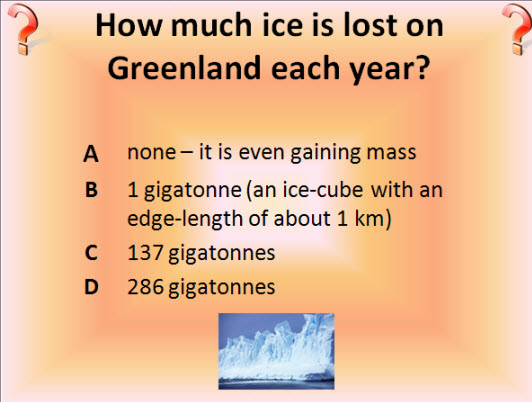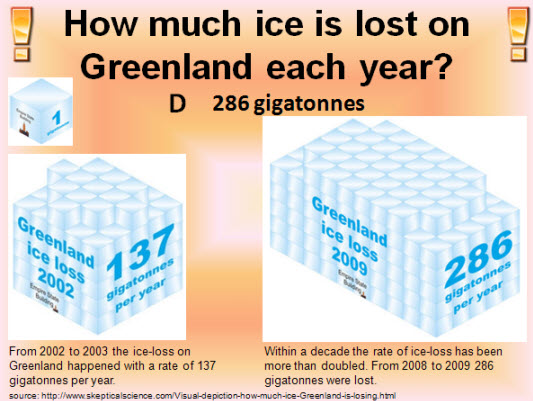So, you think that learning about climate change needs to be tedious?
Posted on 9 February 2011 by BaerbelW
Actually, that isn’t necessarily so if the information is gift-wrapped or disguised as a fun but not trivial climate-quiz! In the course of working as a voluntary zoo-docent, I have helped to put together several quizzes to pique visitors’ interest about specific topics like tigers, rhinos, the rainforests or right now apes. All of these quizzes contain general questions about the animals and areas but don’t shirk away from the hard themes like the dire straits these species and regions are in. Questions which come with striking visuals or comparisons work best to get people thinking. We’ve been using the quizzes as one element of various materials – some of it “hands-on” – on our touch-tables. If the visitors are interested to learn more, some of the questions and answers can then be explained in more detail.
As I was preparing to give a talk about climate change last year, I started to put together a climate-quiz which can simply be printed out, put into a file-folder and put on a desk for people to leaf through on their own. A "quiz-master" can also be at hand to give some assistance or to provide additional explanations to go with the answers. In addition, the quiz can also be used at the start of an otherwise perhaps dry lecture about climate change, or some of the questions and answers can be scattered throughout the presentation to engage the audience (or to keep them alert!).
Here is an example:


The complete quiz is currently available for download as either a PDF-file or as a Powerpoint-version. The latter allows adding suitable animations for online-presentations or creating a “run-it-yourself” interactive version where clicking on the correct answer jumps to the next slide and clicking on a wrong answer just gives a beep. There are other options as well: each slide can be created as a graphics-file (eg. jpg or gif) and these pictures can then be uploaded into an online photo-album – the only caveat for this version is, that there needs to be an option to view the pictures large enough to actually read the text (Note: Kodakgallery lets you switch to "full screen" via a link at the bottom of the screen)!
That's Baerbel's beautiful, visitor-friendly quiz. For a quiz overlapping Baerbel's but with a lower-tech presentation, Anna Haynes has posted the questions on the Warming101 blog and the quiz is also available as two sets of flash cards: one with multiple choice answers and the other with open answers. All the answers come with links to further information.
These quizzes have another purpose: they can help us learn whether Dunning&Kruger's most encouraging finding - that given feedback, even those students who didn't know that they didn't know, could improve - holds true in the realm of climate awareness.
Suggestions? How should we accumulate further quiz questions? What's a good format to store & display them?
Updated February 11: Thanks for all the feedback! The links to the downloads now lead to new versions of the files where suggestions from the comments have been included. A "bonus question" has also been added.































 Arguments
Arguments
























 0
0  0
0






Comments